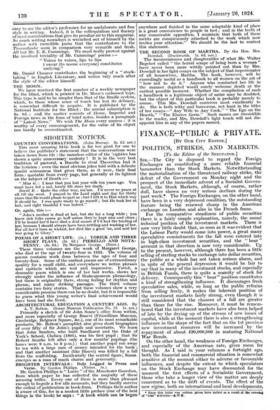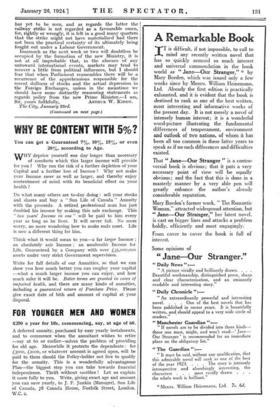FINANCE-PUBLIC & PRIVATE.
[By OUR CITY EDITOR.]
POLITICS, STRIKES, AND MARKETS.
[To the Editor of the SPECTATOR.] SIR,—The City is disposed to regard the Foreign Exchanges as constituting a more reliable financial barometer than the Stock Markets. Notwithstanding the materialization of the threatened railway strike, the defeat of the Government on Monday night and the prospect of the immediate advent of a Socialist Govern- ment, the Stock Markets, although, of course, rather dull, have shown no very serious declines during the past week.* The Foreign Exchanges, on the other hand, have been in a very depressed condition, the outstanding feature being the renewed slump in the American exchange on London and also in the French franc.
For the comparative steadiness of public securities there is a fairly simple explanation, namely, the sound technical position of the investment markets. There is now very little doubt that, as soon as it was evident that the Labour Party would come into power, a great many speculative commitments for the fall were entered into in high-class investment securities, and the " bear " account in that direction is now very considerable. Up to the present, however, although there has been a little selling of sterling stocks to exchange into dollar securities, the public as a whole has not taken serious alarm, and in spite of the general depression it would be fair to say that in many of the investment stocks, and especially in British Funds, there is quite a scarcity of stock for delivery. Consequently this " bear" position constitutes a kind of strengthening influence. It discourages fresh speculative sales, while, so long as the public refrains from selling freely, it makes the inherent position of the investment markets fairly strong, even though it is still considered that the chances of a fall are greater than those for the rise. Moreover, it must be remem- bered that the investment markets have also been helped of late by the drying up of the stream of new issues of capital, while at the moment there is also a strengthening influence in the shape of the fact that on the 1st proximo new investment resources will be increased by the repayment of about £20,000,000 in maturing National War Bonds.
On the other hand, the weakness of Foreign Exchanges, and especially of the American rate, gives room for thought. As I said in your columns a fortnight ago, both the financial and commercial situation is somewhat sensitive at the moment either to adverse or favourable influences, and despite the extent to which speculators on the Stock Exchange may have discounted for the moment the first effects of a Socialistic Government, those who take a longer view of the matter are deeply concerned as to the drift of events. The effect of the new regime, both on international and local developments, • Since this letter was written prices have rallied ass result of the covering of "beer" accounts.—A.W.E. has yet to be seen, and as regards the latter the railway strike is not regarded as a favourable omen, for, rightly or wrongly, it is felt in a good many quarters that the strike might not have materialized. had there not been the practical certainty of its ultimately being fought out under a Labour Government.
Inasmuch as the next week or two will doubtless be occupied by the formation of the new Ministry, it is not at all improbable that, in the absence of any untoward international events, markets may tend to recover a little from political influences, but I should fear that when Parliament reassembles there will be a recurrence of the • apprehensions responsible for the recent dullness of stocks and the actual depression in the Foreign . Exchanges, .unless in the meantime we should have some distinctly reassuring statements as regards policy from the new Prime Minister.—I am, (Continued on next page.)



































 Previous page
Previous page